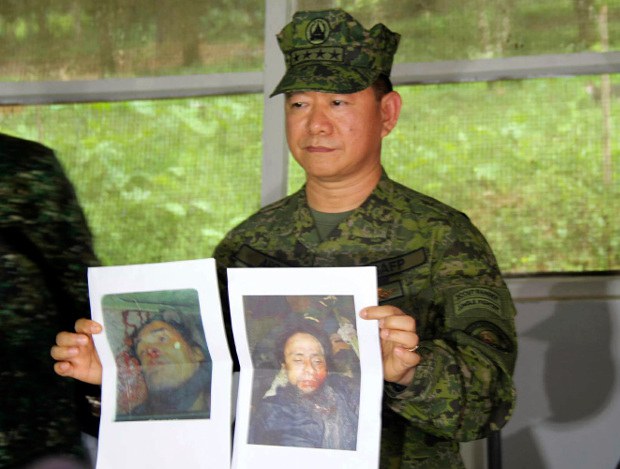US Classifies IS Groups in Bangladesh, Philippines as Global Terrorists
2018.02.27
Washington
 Philippine military chief Gen. Eduardo Año holds pictures of Isnilon Hapilon (right), the acknowledged leader of the Islamic State in the Philippines, and Omarkhayam Maute, leader of the extremist Maute gang, who were killed near the end of the Marawi siege, Oct. 16, 2017.
Philippine military chief Gen. Eduardo Año holds pictures of Isnilon Hapilon (right), the acknowledged leader of the Islamic State in the Philippines, and Omarkhayam Maute, leader of the extremist Maute gang, who were killed near the end of the Marawi siege, Oct. 16, 2017.
The United States on Tuesday declared Islamic State-affiliated groups in Bangladesh and the Philippines as Specially Designated Global Terrorists, which blocks any assets that they may have in American jurisdictions and bars U.S. citizens from making financial transactions with them.
The pro-Islamic State (IS) Neo-JMB in Bangladesh and the Abu Sayyaf and Maute groups in the Philippines have been tagged as global terrorists, the State Department said in a statement.
“These designations target key ISIS-affiliated groups and leaders outside its fallen caliphate in Iraq and Syria,” said Nathan Sales, the State Department’s coordinator for counterterrorism, referring to IS by another name.
“Today’s actions are a critical step in degrading ISIS’s global network and denying its affiliates the resources they need to plan and carry out terrorist attacks,” he said.
In its announcement, the State Department said the newly-designated terror group in Bangladesh began operating in August 2014, when a group of Bangladeshi nationals pledged allegiance to IS.
Gunmen belonging to that group shot and killed an Italian aid worker in Dhaka in September 2015, the announcement said, adding that the group had since claimed numerous attacks carried out across the country, including an overnight siege at the Holey Artisan Bakery café in 2016.
In all, 29 people, including the five militants, died when the gunmen who claimed to be members of the Neo-JMB stormed the upscale café on July 1, 2016, taking dozens of hostages and killing 20 of them using guns and knives, police said.
Since the attack, Bangladesh government officials have adamantly rejected allegations that IS has a presence in the country.
Denying access to financial system
The State Department designations deny blacklisted groups access to the U.S. financial system, making it a crime for American citizens to knowingly provide, or attempt or conspire to provide, material support or resources to the organization.
IS-affiliated groups in Somalia, Tunisia and Egypt also received the same classifications on Tuesday, the department said.
In its news release, the department said that the Maute group, a ragtag band operating mostly in Muslim-populated towns on the southern Philippine island of Mindanao, had pledged allegiance to IS in 2014.
The Maute group joined forces with Isnilon Hapilon, the acknowledged leader of IS in the Philippines, and attacked Marawi city in May 2017, leading to a battle that lasted five months and killed at least 1,200 people, most of them militants.
Hapilon, who has previously been designated as a global terrorist, died in the fighting, as well as the leaders of the Maute group.
The State Department said the Maute group had killed 15 people and wounded 70 others during a bombing of a market in the southern city of Davao in September 2016. Two months later, it said, the group also attempted to detonate a bomb near the U.S. Embassy in Manila.
Washington conference
The designations were announced as the State Department, together with Interpol and the International Institute for Justice, hosted a two-day conference in Washington about mobilizing law-enforcement efforts to defeat IS.
Senior-level justice and law-enforcement officials and diplomats responsible for counterterrorism from about 90 countries and organizations were attending the conference, according to a State Department news release.
The State Department has designated 40 IS leaders and operatives as global terrorists. Those designations, backed by a global coalition of 75 nations, form part of a larger comprehensive plan to defeat the extremists, the department said.
“This effort is destroying ISIS in its safe havens, denying its ability to recruit foreign terrorist fighters, stifling its financial resources, negating the false propaganda it disseminates over the internet and social media, and helping to stabilize liberated areas in Iraq and Syria,” the department said.







